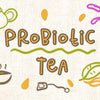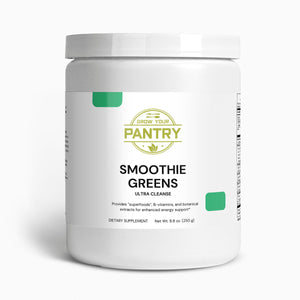Best Tea For Kombucha: Detailed Guide To Each Strain
Which Is The Best Tea For Kombucha?
To brew kombucha tea, black tea is the best due to its nutritional composition as it contains caffeine, nitrogen, and theanine, which the SCOBY (symbiotic culture of bacteria and yeast) needs to feed on. Black teas also provides kombucha with its classic flavor.
However, green, white, oolong, and pu-erh also make for great kombucha tea blends.
What Is Tea?
Camellia Sinensis is an evergreen shrub that grows in subtropical and tropical climates. The countries within this region range from China to Sri Lanka to Kenya; in fact, there are over a thousand known cultivars that are grown in more than 30 countries globally.
Black, green, oolong, white, and pu-erh tea leaves are obtained from the Camellia Sinensis plant (tea plant). These are the only teas that contain the required nutrients a SCOBY needs for long term kombucha brewing.
Can I Use Alternative 'Teas'?
Alternative plants and herbs such as rooibos 'tea,' chamomile 'tea,' etc. can be used to brew. However, none of these are derived from Camellia Sinensis, and SCOBYs can only thrive on Camellia Sinensis tea.
This means if your SCOBY is only used with alternative herbal teas, it may lose its balance and, therefore, not make a nutritionally rich and tasty brew long term. We recommend only using alternative teas in the first ferment if you have plenty of SCOBYs to spare.
Apart from lacking the nutritional value that's required, most herbal teas also contain molecules such as essential oils that interact with the culture leading to decreased bacteria culture population.
For this reason, other types of tea can be used in the second ferment process. The second ferment is carried out once the SCOBY is removed, and therefore cannot come into harm. A second ferment is a short anaerobic fermentation stage that's used to infuse secondary flavor to raw kombucha.
Not Much Time? Skip To What You'd Like To Learn...
-
Best Teas For Brewing Kombucha
-
Health Benefits Of Drinking Tea
-
Loose Leaf Tea vs. Tea Bags
-
Mixed Tea vs. Single Strain
-
How To Tell The Quality Of The Tea
-
30 Tea Leaf Varieties
-
List Of Teas To Avoid and Why
-
How To Experiment To Come Up With Your Own Tea Blend
Best Teas For Brewing Kombucha

Black Tea:
Tea Brand |
Flavor Profile |
Why It Was Selected |
Price |
Lipton Black Tea |
Orange Pekoe |
Lipton has always offered consistent flavors over the years making it a reliable brand |
$0.03 per tea bag |
The Republic of Tea British Breakfast Black Tea |
British Breakfast Black |
Republic of tea offers the classic british breakfast tea with the original taste notes at an affordable rate |
$0.67 per tea bag |
Ringtons Tea Black Tea |
Breakfast Blend |
Best budget tea pack while still maintaining the quality |
$0.13 per tea bag |
Green Tea:
Tea Brand |
Flavor Profile |
Why It Was Selected |
Price |
The Republic of Tea Honey Ginseng Green Tea |
Linden flowers |
More than just a blend of green tea, this tea type also contains ginseng herb for additional antioxidants |
$0.75 per tea bag |
Salada Teas Green Tea |
Peach mango |
Salada green tea is a bargain especially when buying in bulk |
$0.17 per tea bag |
Tiesta Tea Matcha Green Tea Powder |
Fresh and pure |
100% natural, award winning green tea at an affordable rate |
$3.33 per oz |
White Tea:
Tea Brand |
Flavor Profile |
Why It Was Selected |
Price |
Harney & Sons White Tea |
Grapefruit Almond flavor |
Most affordable premium white tea brand in the market |
$0.47 per tea bag |
Salada 100% Pure White Tea |
White tea flavor |
If you are looking for a no frills white tea brand then this should be your go to choice |
$5.34 per oz |
The Republic of Tea Orange Blossom White Tea |
Honey mango white |
Republic of tea offers a blend of honey and mango flavors to compliment the flowery notes of their white tea for the ultimate taste |
$0.32 per tea bag |
Oolong Tea:
Tea Brand |
Flavor Profile |
Why It Was Selected |
Price |
The Republic of Tea Dragon Oolong Tea |
Flowery aromatics |
Standard oolong tea at an affordable rate |
$0.37 per teabag |
Da Hong Pao Roasted Oolong Tea Loose Leaf |
Da Hong Pao |
The roasted loose leaf tea is more than a bargain |
$3.83 per oz |
Oolong Tea - Tie Guan Yin Tea |
Earthy flavor |
This package is highly economical for anyone looking to buy oolong tea in bulk |
$8.29 per oz |
Health Benefits Of Drinking Tea

Contains Caffeine
The leaves of tea plants naturally contain caffeine, which is a brain stimulant. Caffeine works by blocking the neural receptors responsible for slowing down brain activity, thus leading to increased brain activity hence improved concentration. Caffeine also improves one's alertness all day long, making it a must-have for millions of people. Unlike other sources of caffeine, raw kombucha only contains 20% of the original amount of caffeine found in the leaves that were used to prepare the fresh tea before fermentation. During the fermentation process, the culture feeds on most of the caffeine, making kombucha a much healthier and controlled source of caffeine as compared to coffee or other beverages.
Contains Antioxidants
Tea leaves, especially green ones, contain a considerable number of natural antioxidants known as polyphenols. Once absorbed in the bloodstream, they usually react with free radicals, thus removing them from the body. These free radicals would otherwise react with healthy cells harming them or, worse. They can react with DNA and cause unknown mutations which lead to cancer.
Contains Vitamins
Tea contains several vitamins, including A, C, and E. These play various critical roles in the body ranging from maintaining the immune system to aiding in eye health. These vitamins get infused into the boiling water during the steeping process and are passed on to the final kombucha brew during the fermentation process.
Help In Weight Loss
The tea plant contain a considerable number of flavonoids such as catechins, which are responsible for increased metabolism. Once consumed, these molecules usually trigger a rise in the metabolic rate, which burns more carbs and fats. This eventually leads to a gradual breakdown of stored fats in the body hence the losing weight.
Loose Leaf Tea vs. Tea Bags

Loose leaf tea refers to tea that's in the form of dried tea leaves and is usually packaged in airtight sachets instead of teabags. Loose-leaf contains marginally larger pieces of tea leaves that still retain most of their essential oils and aroma.
Pros:
-
Buying loose leaf in bulk is often more economical than buying pre-packaged bags.
-
Loose leaf is often higher in quality as the leaves are not usually broken down and, therefore, still retain their natural flavor.
-
Loose leaf offers a more vibrant flavor due to the retained essential oils and aroma.
Cons:
-
Loose leaves are not as common as tea bags making it hard to obtain them in local grocery shops.
-
Loose leaves have to be measured out and lack the ease of use that's associated with tea bags.
Teabags, on the other hand, contain finely broken leaves that are mainly "dust and fanning" from broken tea leaves. These will have lost some of their aroma and essential oils and instead release more tannins during steeping, which leads to a bitter, astringent brew.
Pros:
-
Teabags are much easier to use as they do not require to be measured out or sieved after the steeping process.
-
Teabags are more common and hence easier to obtain compared to loose.
Cons:
-
Teabags contain fine tea dust, which lacks the nutritional value that's often retained by whole loose leaves.
-
Teabags usually constrict the leaves from expanding fully, and this prevents the flavors from fully infusing, which leads to lower flavor quality.
Expansion During Brewing
Tea leaves require extra expansion room during brewing to produce full-bodied flavor. Loose tea leaves are measured out as per the amount of brew needed and steeped in the pot with as much free space, unlike tea bags which enclose the tea leaves within a restricted area. This prevents the leaves from expanding fully; thus, the size of the tea bag limits the amount of flavor and micronutrients released.
Mixed Tea vs. Single Strain

Single strain tea, also referred to as single estate tea contains 100% of a unique variety of tea leaves. On the other hand, mixed tea refers to a blend of various teas that have been carefully mixed to achieve the desired flavor palate.
Your taste preferences should guide the choice of whether to use a mixed tea blend or a single tea strain in your kombucha. Mixed teas offer a complex blend of aromas and taste notes, which can be customized by adjusting the amounts of each tea in the final blend. On the other hand, single strain tea only contains a single broad flavor which you can always rely on and expect with each brew.
How To Tell The Quality Of The Tea

Sight
There are two kinds of tea processing systems that are applied after harvesting, and these usually determine the quality of the final product. In the first process known as CTC (cut, tear, curl), specialized machine cuts, tears, and curls, the tea leaves into small pellets. This delivers a robust dark brew at the expense of the subtle aromas of tea. Tea which has been processed via CTC usually gets packed into tea bags.
The second system, referred to as Orthodox, relies on delicately handling the leaves to minimize tearing. As a result, the leaves are curled without any cuts, which preserve the aromatic compounds and complex flavors. The Orthodox method is used to prepare loose leaf tea. Avoid any that look crumbly or contains stalks or woody fragments. Such would have complex tastes and would be less flavorful.
Smell
High-quality tea should have a noticeable aroma. If you inhale deeply and can't notice any scent or it's too weak, then the chances are that you are dealing with low-quality tea. Different varieties also have differing aromas whereby green teas will have a light, fresh grassy scent while black teas more floral, sweet, and earthy. After steeping, the aromas should be more amplified with the unique scents of dry tea leaves becoming more distinct.
Touch
High quality loose dried leaves are smooth, whole, and sturdy. The loose leaves should also have a slight heft; if they feel feather-light, then that's an indication of over-dried leaves or that they have been stored for too long and are now getting old. High-quality tea leaves should also not disintegrate or crumble with gentle handling; if they do, then that's an indication of over-drying. After steeping, the tea should feel slippery with a smooth texture; the presence of hard crumbles is an indication of low-quality tea leaves.
Taste
High-quality tea is easily noticeable due to its recognizable and robust taste. Such tea will always activate various flavor sensations on your tongue, ranging from refreshing to intense taste. On the other hand, low-quality tea use overlay astringent with an unpleasant chemical taste that feels bland.
30 Tea Leaf Varieties

Tea Variety: Green tea
Strain: Camellia Sinensis
Tasting Notes: Smooth, refreshing, grassy
Origin: China
Price per 4 oz: $8.45
Does It Work Well With Kombucha? Yes, it produces a great tasting brew and is also provides the nutrients required by the SCOBY.
Additional Notes: Green tea leaves and buds do not undergo the withering and oxidation process that's used in other teas, providing a smooth, grassy flavor. Green tea is said to have originated from ancient China before spreading eastwards. The leaves are priced for their medical benefits with a wide range of effects on health.
Tea Variety: Black tea
Strain: Camellia Sinensis
Tasting Notes: Bold aromas with some bitter
Origin: China
Price per 4 oz: $5.49
Does It Work Well With Kombucha? Yes, it's the most recommended tea for making kombucha while allowing your SCOBY to thrive.
Additional Notes: Contrary to popular belief, black tea was discovered after green tea. Current evidence points to Chinese mountainous highlands as the origin of black tea. Since then, the plant has been spread worldwide and is the most consumed tea plant. This is due to its bold aromas, golden-brown colored brew, and a strong taste.
Tea Variety: White tea
Strain: Camellia Sinensis
Tasting Notes: Light and slightly sweet
Origin: China
Price per 4 oz: $14.71
Does It Work Well With Kombucha? Yes, it contains the nutrients required by the culture while also offering a sweet flavor.
Additional Notes: Although there’s very little international agreement on a generally accepted definition of what white tea is. Usually, it’s a style of tea that uses young and minimally processed Camellia Sinensis leaves. The young leaves and buds are picked just before the buds open up and are then allowed to wither under the natural sun. The tea is not oxidized or rolled; this results in lighter tones compared to green or the traditional black tea.
Tea Variety: Oolong tea
Strain: Camellia Sinensis
Tasting Notes: Full-bodied floral, grassy
Origin: China
Price per 4 oz: $12.21
Does It Work Well With Kombucha? Yes, it provides a rich flavor and nutrients that are required by the SCOBY.
Additional Notes: Oolong tea is a traditional semi-oxidized Chinese tea that’s produced by withering the leaves and buds under the intense sun to allow oxidation before the curling and twisting process begins. There are various styles of oolong tea, which depend on the level of oxidation and the different cultivars used. Oolong tea gains woody and roasted aromas with fresh floral notes due to this unique oxidation process.
Tea Variety: Pu'erh/ puer Tea
Strain: Fermented Camellia Sinensis
Tasting Notes: Astringent with woody, mellow
Origin: Yunnan province of China
Price per 4 oz: $4
Does It Work Well With Kombucha? Yes, the mellowy notes are perfect for making kombucha and the nutrients will ensure that your SCOBY continues to grow as the brew ferments.
Additional Notes: Pu’erh is a type of fermented Chinese tea that’s obtained from the microbial fermentation and oxidation of tea leaves and buds after they have been rolled and dried. This results in a dark tea that can be pressed into many shapes and will gradually continue to ferment and mature with time. This results in a rich woody, almost mellowly brew, with some of the older tea leaves gaining an astringent flavor due to continued oxidation and fermentation.
Tea Variety: Chamomile tea
Strain: Matricaria Chamomilla
Tasting Notes: Fresh apple-like, flowery
Origin: Ancient Egypt
Price per 4 oz: $7.19
Does It Work Well With Kombucha? It can only be used to flavor during the second ferment, and it lacks the nutrients required by the SCOBY. If you have surplus SCOBYs, you can experiment with the tea in the first ferment, although the SCOBY will lose its health with each successive brew.
Additional Notes: Chamomile tea is prepared from the dried leaves of several daisy-like plants belonging to the Asteraceae family. These have a flavor that’s distinctively similar to that of fresh apples. It was first used in ancient Egypt before the name chamomilla was adapted in the 13th century, which translates to earth apple.
Tea Variety: Rooibos tea
Strain: Aspalathus Linearis
Tasting Notes: Sweet, slightly nutty
Origin: South Africa
Price per 4 oz: $3.9
Does It Work Well With Kombucha? Yes, it offers a great tasting brew, but it lacks some of the nutrients that a SCOBY requires such as caffeine.
Additional Notes: Rooibos tea is well known for its tea-like flavor without the extra caffeine that’s associated with camellia species. This bushy plant originally from South Africa produces a slightly nutty flavor with hints of sweetness. Rooibos leaves have a distinctive reddish hue that gets infused to the final brew.
Tea Variety: Darjeeling tea
Strain: Camellia Sinensis
Tasting Notes: Musky, sweet, mossy, fruity
Origin: Bengal
Price per 4 oz: $4
Does It Work Well With Kombucha? Yes, it offers richly flavored brews that contains the nutrients required by the SCOBY.
Additional Notes: Darjeeling tea is a variety of Camellia Sinensis that’s grown and produced in the Darjeeling district of West Bengal, India. The tea was traditionally made as a black tea and is designated according to the harvesting time. The first flush is harvested after the rainy season and has a very light color and is mildly astringent. The second flush is harvested in June and produces a full-bodied muscatel flavored and amber-colored brew. The autumnal flush is harvested during autumn and has fewer delicate flavors as well as less spicy notes but with a much darker color and fuller body.
Tea Variety: Jasmine tea
Strain: Jasminum Sambac and Camellia Sinensis
Tasting Notes: Delicate, floral, sweet
Origin: China
Price per 4 oz: $5
Does It Work Well With Kombucha? Yes, the flavor combination is perfect for a fermented brew, and the added Camellia Sinensis ensures that your SCOBY thrives during the fermentation stage.
Additional Notes: Jasmine tea is a variety of tea that’s been flavored with the aroma of jasmine blossoms. Ordinarily, green tea is used as a base, but white and black tea can also be used. Jasmine tea is believed to have originated from China before spreading eastwards during the Qing dynasty. Jasmine tea contains a wide variety of antioxidants mainly from the two plant varieties that are used in its preparation, making it one of the healthiest teas out there.
Tea Variety: Ceylon tea
Strain: Camellia Sinensis
Tasting Notes: Bold, brisk, hints of citrus and spices
Origin: Sri Lanka
Price per 4 oz: $3.9
Does It Work Well With Kombucha? Yes, the final brew has a rich flavor and also provides caffeine and nitrogen that are required by the SCOBY.
Additional Notes: Ceylon tea refers to Sri Lankan tea and usually comes in various varieties such as black, white, and green tea. Sri Lankan tea is grown and packaged exclusively in the former British colony of Ceylon, currently known as Sri Lanka. The unique climatic conditions give the tea leaves one of the smoothest flavor indexes with bold and brisk notes. The green and white tea varieties have citrus and spicy notes not found anywhere else.
Tea Variety: Cinnamon tea
Strain: Cinnamomum Verum
Tasting Notes: Woody, sweet-savory, incredible aroma
Origin: North Africa
Price per 4 oz: $7
Does It Work Well With Kombucha? It can only be used to flavor during the second ferment, and it also lacks the nutrients required by the SCOBY. If you have surplus SCOBYs, you can experiment with the tea in the first ferment, although the SCOBY will lose its health with each successive brew.
Additional Notes: Cinnamon tea is a spice obtained from the barks of several tree species belonging to the Cinnamomum genus. The inner bark is mainly used as an aromatic condiment but can also be crushed and used to brew cinnamon tea. The barks produce a sweet-savory flavor with noticeable woody flavors and an incredible aroma. The tea has a mid-brown color that’s infused from the inner barks.
Tea Variety: Lemongrass tea
Strain: Cymbopogon Citratus
Tasting Notes: Lemon-mint, tangy
Origin: Sri Lanka
Price per 4 oz: $6
Does It Work Well With Kombucha? It can only be used to flavor during the second ferment as it lacks the nutrients required by the SCOBY to thrive.
Additional Notes: Lemongrass is a barbed grass belonging to the grass family that’s commonly cultivated for its medical and culinary use in Asia and Africa. The plant has a wide range of applications ranging from essential oils to even insect repellants due to its chemical constitution. Lemongrass tea has a minty lemon flavor with tangy notes, which are almost as bitter as actual lemons.
Tea Variety: Dandelion tea
Strain: Taraxacum Laevigatum
Tasting Notes: Delicate, sweet, herbaceous
Origin: Eurasia
Price per 4 oz: $7.35
Does It Work Well With Kombucha? Great flavor that can only be used to flavor during the second ferment as it does not contain the micronutrients that are required by the kombucha culture. However, if you have surplus SCOBYs, you can experiment with the tea in the first ferment, although the SCOBY will lose its health with each successive brew.
Additional Notes: Dandelion tea can be prepared either from the dried yellow flowers or from the roots of the dandelion plant. The flowers produce a delicate sweet flavor with herbaceous notes while the roots provide a toasty, almost smoky flavor with complex notes. Tea prepared from the dandelion roots has a similar taste to coffee, making it one of the most used coffee substitutes.
Tea Variety: Eucalyptus tea
Strain: Eucalyptus Obliqua
Tasting Notes: Minty, smooth, astringent
Origin: Australia
Price per 4 oz: $3.95
Does It Work Well With Kombucha? It can only be used to flavor during the second ferment as it contains essential oils with antibacterial properties, these are considered harmful to the SCOBY.
Additional Notes: The eucalyptus genus has over seven hundred individual species, which are flowering trees whose leaves contain oil glands. The trees are initially from Australia but can grow just about anywhere as long as the soil is well-drained, and the temperatures are within the tropical ranges. Eucalyptus tea has a minty smooth flavor with subtle astringent notes thanks to the essential oils.
Tea Variety: Fennel tea
Strain: Foeniculum Vulgare
Tasting Notes: Bitter, sour
Origin: Greece
Price per 4 oz: $4.99
Does It Work Well With Kombucha? It can only be used to flavor during the second ferment as it cannot sustain the growing SCOBY in the first ferment.
Additional Notes: The fennel plant is a flowering plant that belongs to the carrot family whose bulb-like stem base is used to brew tea. The plant was initially used in ancient Greece and Rome, after which it spread to other regions with dry soils near sea coasts. Fennel tea has a savory herbal flavor and produces a bitter, sour flavored brew with an almost bitter aftertaste.
Tea Variety: Purple tea
Strain: Camellia Sinensis
Tasting Notes: Intensely floral
Origin: Kenya
Price per 4 oz: $3
Does It Work Well With Kombucha? Yes, it's rich in caffeine, and other nutrients that are required by the SCOBY and the kombucha has a rich flavor.
Additional Notes: Purple tea is a new variety of Camellia Sinensis that’s rich in flavonoids and antioxidants. The plant though reddish-purple in color produces aromatic tea leaves with the final product retaining a slightly purple like hue after the oxidation process. Due to its high levels of anthocyanins, the tea is used for anti-inflammatory benefits.
Tea Variety: Uva Ursi tea
Strain: Arctostaphylos Uva-Ursi
Tasting Notes: Bitter
Origin: Alaska
Price per 4 oz: $5
Does It Work Well With Kombucha? It can only be used to flavor during the second ferment as it contains antibacterial properties that would otherwise harm the SCOBY.
Additional Notes: Uva ursi, also known as grape of the bear, is a plant species that grows in the greater subarctic northern hemisphere region. Traditionally uva ursi was used for medical purposes as a laxative and diuretic as well as urinary tract antiseptic. Due to its considerable phytochemical composition, the plant usually produces a slightly bitter brew, and caution should be observed during its consumption. Large doses can lead to allergic reactions, seizures, and nausea.
Tea Variety: Dark tea
Strain: Camellia Sinensis
Tasting Notes: Full-bodied, earthy, smooth, sweet
Origin: China
Price per 4 oz: $8.95
Does It Work Well With Kombucha? Yes, the tea contains the nutrients required by the SCOBY while also adding a sweet flavor to the brew.
Additional Notes: Dark tea starts as green tea leaves and buds which have been freshly harvested just before the buds open up. These undergo a short oxidation period before they curl up and are then fermented for several months. The resulting product is a dark clump of fermented tea leaves, which produce a dark brew which becomes darker with each additional day of fermentation and oxidation.
Tea Variety: Sencha tea
Strain: Camellia Sinensis
Tasting Notes: Refreshing, seaweedy, grassy
Origin: Japan
Price per 4 oz: $4.5 per 4 oz
Does It Work Well With Kombucha? Yes, Camellia Sinensis provides all of the required nutrients to enable the SCOBY to grow while also infusing a refreshing taste to the final kombucha brew.
Additional Notes: Sencha tea refers to Japanese green tea, which has been prepared by infusion. The flavor of sencha tea will depend on the season, the location it's produced, and the picking time. Sencha gains its ideal greenish golden color depending on the temperature of the water used to steep the green tea leaves. The final brew has a refreshing taste with seaweedy and grassy notes.
Tea Variety: Chrysanthemum tea
Strain: Chrysanthemum Morifolium
Tasting Notes: Herbal honey, sweet
Origin: China
Price per 4 oz: $6.95
Does It Work Well With Kombucha? It has sweet notes that can only be used to flavor during the second ferment as it lacks the required nutrients that enable the SCOBY to grow. If you have surplus SCOBYs, you can experiment with the tea in the first ferment, although the SCOBY will lose its health with each successive brew.
Additional Notes: Chrysanthemum tea is a herbal tea prepared from the dried-up flowers of the chrysanthemum herb, which is mainly grown in East Asia. While the plant is primarily used to increase sexual vitality, it does contain a considerable number of natural antioxidants. It produces a clear to yellow brew depending on the maturity of the flowers when they were picked. The brew has a herbal honey flavor with mildly sweet notes.
Tea Variety: Hibiscus tea
Strain: Hibiscus Sabdariffa
Tasting Notes: Tart, bitter aftertaste
Origin: North Africa
Price per 4 oz: $4.95
Does It Work Well With Kombucha? It can only be used to flavor during the second ferment.
Additional Notes: Hibiscus tea can be prepared by brewing fresh hibiscus flowers with ginger in boiling water. After steeping the tea, sugar is added or clove and cinnamon to spice the brew and reduce the tartness. Alternatively, you can use dried hibiscus flowers to prepare the drink, although the tart flavor will leave an almost bitter aftertaste.
Tea Variety: Barley tea
Strain: Hordeum Vulgare
Tasting Notes: Toasty, bitter undertones
Origin: Japan
Price per 4 oz: $7.95
Does It Work Well With Kombucha? It lacks the nutrients that the SCOBY requires and can, therefore, only be used to flavor during the second ferment.
Additional Notes: Barley tea is a grain-based infusion that’s prepared using roasted barleys and was first brewed in Japan. The tea has a toasty flavor originating from the roast barley grains and slightly bitter undertones. The herbal tea gains a golden-brown hue after the steeping process and is often drunk cold.
Tea Variety: Chaga tea
Strain: Inonotus Obliquus
Tasting Notes: Earthy, bitter, mushroomy
Origin: Russia
Price per 4 oz: $5.5
Does It Work Well With Kombucha? The mushroomy flavor matches perfectly with kombucha flavor, but it can only be used to flavor during the second ferment as it has antibacterial properties which can harm the SCOBY.
Additional Notes: Chaga is a fungus belonging to the hymenochaetaceae family that’s originally from Russia. Chaga tea has long been used for medicinal purposes in the northern hemisphere. Chaga tea contains enormous concentrations of melanin and oxalates, which can prevent proper uptake of minerals; for this reason, you should consult a doctor before taking Chaga tea.
Tea Variety: Chai tea
Strain: Camellia Sinensis
Tasting Notes: Spicy, bold, bitter
Origin: South Asia
Price per 4 oz: $2.95
Does It Work Well With Kombucha? The flavor balances it the tartness of raw kombucha, but it can only be used to flavor during the second ferment as it contains essential oils which are harmful to SCOBY.
Additional Notes: Chai tea is prepared using black tea with a mix of spices such as cinnamon, cardamom, ginger, black peppercorns, and cloves. This results in a bold flavor with black tea notes and noticeable spicy notes. Chai tea was initially brewed in south Asia before spreading eastwards. Due to its considerable spice concentration, the tea usually requires sugar to balance off the bitter notes in the spices.
Tea Variety: Essiac tea
Strain: Burdock Root, Turkey Rhubarb, and Slippery Elm
Tasting Notes: Herbal, bitter aftertaste
Origin: Canada
Price per 4 oz: $5.65
Does It Work Well With Kombucha? It can only be used to flavor during the second ferment due to its high concentration of essential oils, which are harmful to the kombucha culture.
Additional Notes: The original Essiac tea recipe was invented in the early 1900s by a Canadian nurse and required a blend of burdock root, slippery elm, turkey rhubarb, and sheep sorrel herbs. These herbs have a bitter aftertaste and are said to have cancer-fighting properties, although actual medical evidence on the same does not exist.
Tea Variety: Matcha tea
Strain: Camellia Sinensis
Tasting Notes: Rich aroma, astringent
Origin: Japan
Price per 4 oz: $2.95
Does It Work Well With Kombucha? Yes, it offers the required nutrients while enriching the kombucha with an aromatic flavor.
Additional Notes: Matcha tea translates to fine powder tea in Japan. This finely ground powder is obtained from processed green tea leaves which have been shade-grown for three weeks before harvesting. This allows the plant to produce more caffeine and theanine, making matcha tea stronger compared to other Japanese varieties.
Tea Variety: Moringa tea
Strain: Moringa Oleifera
Tasting Notes: Earthy
Origin: India
Price per 4 oz: $3
Does It Work Well With Kombucha? It can only be used to flavor during the second ferment as it lacks the nutrients that are required by the SCOBY.
Additional Notes: Moringa is a fast-growing tropical tree originally from India that produces oil-rich seeds while every part of the rest of the tree is edible. Moringa tea is prepared from the leaves of the drum stick plant and undergoes oxidation before they are crushed. The tea has an earthy flavor with creamy notes and contains antioxidants and other bioactive compounds that are necessary for a healthy immune system.
Tea Variety: Nettle tea
Strain: Urtica Dioica
Tasting Notes: Earthy, rich
Origin: Europe
Price per 4 oz: $6.5
Does It Work Well With Kombucha? The flavor is perfect for a second ferment, but it lacks the nutritional benefit that's required by the SCOBY.
Additional Notes: Stinging nettle may have an unpleasant sting when the leaves are still green, but inside them lies a whole lot of healthy goodness. The plant, which is primarily from Europe and Asia, is edible, and the leaves can be dried and used as tea leaves. Nettle tea is rich in antioxidants, proteins, and minerals, such as iron.
Tea Variety: Senna tea
Strain: Senna Alexandrina
Tasting Notes: Slightly sweet, bitter undertones
Origin: India
Price per 4 oz: $3.95
Does It Work Well With Kombucha? It can only be used to flavor during the second ferment as it lacks the required nutrients to keep the SCOBY alive. If you have surplus SCOBYs, you can experiment with the tea in the first ferment, although the SCOBY will lose its health with each successive brew.
Additional Notes: Senna plant is a flowering legume that’s originally from India. While the plant is mainly used as an ornamental plant, the leaves and flowers can also be used to prepare Senna tea. The brew has a slightly sweet flavor, but this usually gets masked by the bitter undertones. The tea can be used as a laxative.
Tea Variety: Rose tea
Strain: Rosa Rubiginosa
Tasting Notes: Floral, fruity, tangy
Origin: China
Price per 4 oz: $3.5
Does It Work Well With Kombucha? The floral notes are perfect for flavoring kombucha although, it can only be used to flavor during the second ferment as it lacks the nutritional value required by the SCOBY.
Additional Notes: The rose tree is a woody tree with perennial flowers that range in color from pink to yellow and even red. While the tree is mostly grown for ornamental purposes, its bright flowers can be used to brew rose tea. This results in a pinkish colored brew with subtle floral notes and a slightly fruity and tangy flavor.
List Of Teas To Avoid and Why

Earl Grey Tea
Earl grey tea refers to a blend of tea leaves that contain added bergamot oil, which is an essential oil that is extracted from bergamot trees. The essential oil contains antibacterial properties, which will decimate the good bacteria culture in the SCOBY.
However, just about with any tea, many people have made successful batches with earl grey. If you have a spare SCOBY, feel free to experiment with earl grey.
Masala Chai Tea
Masala chai tea is an aromatic Indian tea blend that's prepared by mixing black tea with herbs and spices. This results in increased essential oil concentration, which is harmful to the bacteria culture and can interfere with the fermentation process. Similar to earl grey, if you have spare SCOBY, try our using masala chai and see how it goes. Make sure to keep rotating your SCOBYs with regular black tea to ensure they stay healthy.
How To Experiment To Come Up With Your Own Tea Blend

Gather The Required Ingredients
The tea blending process will require a primary tea to be used as a base tea and the secondary ingredients, which might include other teas as well as flavoring ingredients such as herbs and spices. Ensure that you have all the required ingredients on hand.
Experiment With Various Ratios
To identify the perfect blend of flavors, you will have to experiment with different proportions, start with a 1:1 ratio, and adjust accordingly until you have the perfect combination of aromas and taste. For this process, it's recommended to use small quantities to avoid wasting too many raw materials. After each ratio adjustment, you should brew a bit of tea with the new blend to see if it does bring out the required flavor profile.
Switch The Ingredients If You Are Yet To Find The Perfect Match
If adjusting the ratios does not result in the required taste notes, you can switch the ingredients or use an entirely different base tea such as green tea or Oolong.







